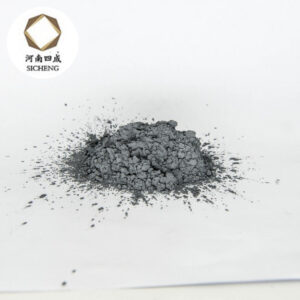Black Silicon Carbide: Revolutionizing Automotive Flame-Retardant Batteries
In the rapidly evolving landscape of electric vehicles (EVs), ensuring battery safety is paramount. As thermal runaway and fire hazards remain critical concerns, black silicon carbide (SiC) emerges as a game-changing material, offering unparalleled performance in automotive flame-retardant batteries.
Black SiC, a synthetically produced crystalline compound renowned for its extreme hardness and high thermal conductivity, is redefining battery safety standards. With a thermal conductivity of up to 490 W/m·K—significantly higher than traditional materials like aluminum oxide—it efficiently dissipates heat, preventing dangerous temperature spikes that can trigger thermal runaway. Its robust chemical stability and low coefficient of thermal expansion also ensure long-term reliability under diverse operating conditions, safeguarding against structural degradation and potential fire risks.
The integration of black SiC in battery thermal management systems is a breakthrough innovation. As a key component in heat sinks, ceramic substrates, and thermal interface materials, it enhances heat transfer between battery cells and cooling systems, reducing hotspots by up to 30%. In a recent study, batteries equipped with black SiC-based heat sinks demonstrated a 25% decrease in peak operating temperatures during rapid charging, highlighting its efficacy in maintaining optimal thermal conditions.
Moreover, black SiC’s inherent flame-retardant properties contribute to enhanced battery safety. Its high melting point of 2,730°C and resistance to oxidation create a protective barrier, suppressing flame spread and preventing the release of flammable gases. When incorporated into battery separators or encapsulation materials, it forms a fire-resistant layer, effectively containing thermal runaway events and minimizing the risk of catastrophic failures.



Industry adoption of black SiC is accelerating, driven by stringent safety regulations and consumer demand for reliable EVs. Major battery manufacturers are investing heavily in R&D, exploring advanced composite materials that combine black SiC with polymers and ceramics to achieve superior flame retardancy and mechanical strength. These innovations not only improve battery safety but also enhance energy density and lifespan, paving the way for next-generation EVs.
As the automotive industry transitions towards sustainable mobility, black silicon carbide stands at the forefront of battery safety innovation. Its unique combination of thermal conductivity, chemical stability, and flame-retardant properties makes it an ideal material for developing safer, more efficient, and reliable electric vehicle batteries. With continued advancements, black SiC is set to revolutionize the future of automotive energy storage, driving the widespread adoption of EVs worldwide.
